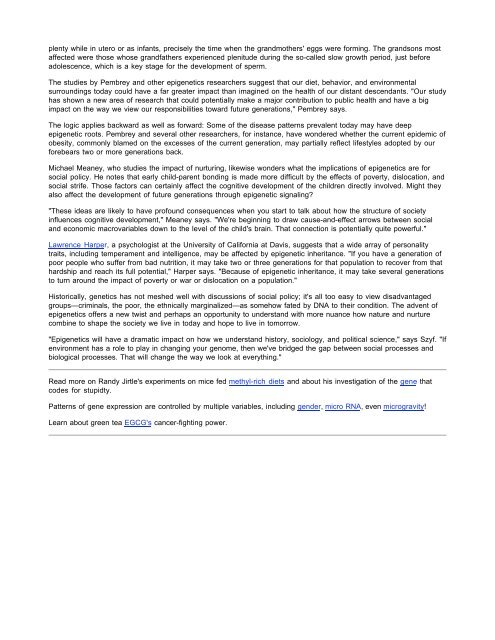DNA Is Not Destiny | Living World | DISCOVER Magazine
DNA Is Not Destiny | Living World | DISCOVER Magazine
DNA Is Not Destiny | Living World | DISCOVER Magazine
Create successful ePaper yourself
Turn your PDF publications into a flip-book with our unique Google optimized e-Paper software.
plenty while in utero or as infants, precisely the time when the grandmothers' eggs were forming. The grandsons most<br />
affected were those whose grandfathers experienced plenitude during the so-called slow growth period, just before<br />
adolescence, which is a key stage for the development of sperm.<br />
The studies by Pembrey and other epigenetics researchers suggest that our diet, behavior, and environmental<br />
surroundings today could have a far greater impact than imagined on the health of our distant descendants. "Our study<br />
has shown a new area of research that could potentially make a major contribution to public health and have a big<br />
impact on the way we view our responsibilities toward future generations," Pembrey says.<br />
The logic applies backward as well as forward: Some of the disease patterns prevalent today may have deep<br />
epigenetic roots. Pembrey and several other researchers, for instance, have wondered whether the current epidemic of<br />
obesity, commonly blamed on the excesses of the current generation, may partially reflect lifestyles adopted by our<br />
forebears two or more generations back.<br />
Michael Meaney, who studies the impact of nurturing, likewise wonders what the implications of epigenetics are for<br />
social policy. He notes that early child-parent bonding is made more difficult by the effects of poverty, dislocation, and<br />
social strife. Those factors can certainly affect the cognitive development of the children directly involved. Might they<br />
also affect the development of future generations through epigenetic signaling<br />
"These ideas are likely to have profound consequences when you start to talk about how the structure of society<br />
influences cognitive development," Meaney says. "We're beginning to draw cause-and-effect arrows between social<br />
and economic macrovariables down to the level of the child's brain. That connection is potentially quite powerful."<br />
Lawrence Harper, a psychologist at the University of California at Davis, suggests that a wide array of personality<br />
traits, including temperament and intelligence, may be affected by epigenetic inheritance. "If you have a generation of<br />
poor people who suffer from bad nutrition, it may take two or three generations for that population to recover from that<br />
hardship and reach its full potential," Harper says. "Because of epigenetic inheritance, it may take several generations<br />
to turn around the impact of poverty or war or dislocation on a population."<br />
Historically, genetics has not meshed well with discussions of social policy; it's all too easy to view disadvantaged<br />
groups—criminals, the poor, the ethnically marginalized—as somehow fated by <strong>DNA</strong> to their condition. The advent of<br />
epigenetics offers a new twist and perhaps an opportunity to understand with more nuance how nature and nurture<br />
combine to shape the society we live in today and hope to live in tomorrow.<br />
"Epigenetics will have a dramatic impact on how we understand history, sociology, and political science," says Szyf. "If<br />
environment has a role to play in changing your genome, then we've bridged the gap between social processes and<br />
biological processes. That will change the way we look at everything."<br />
Read more on Randy Jirtle's experiments on mice fed methyl-rich diets and about his investigation of the gene that<br />
codes for stupidty.<br />
Patterns of gene expression are controlled by multiple variables, including gender, micro RNA, even microgravity!<br />
Learn about green tea EGCG's cancer-fighting power.


